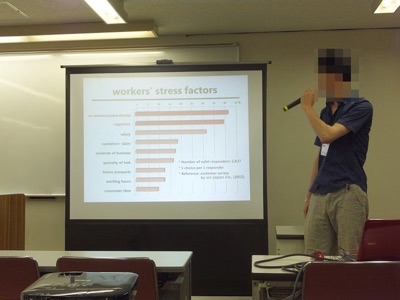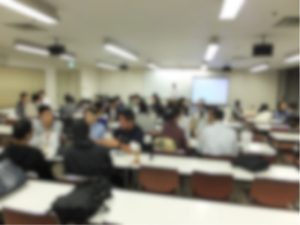1.マテリアルの紹介Kさん

2.会場の様子

5月27日(土)開催の第151回workshop詳細
○workshop参加人数:45名(うち新人の方:3名)
○【前半】:How superior/subordinate should be
○【後半】:Shu-katsu!!
:::::::::::::::::::::::::::::::::::::::::::::::::::::::::::::::::::::::::::::::::
≪FIRST HALF≫
≪AGENDA≫
How superior/subordinate should be
≪INTRODUCTION≫
The phrase “mental health” became popular, and MHLW(Ministry of Health, Labour and Welfare, 厚生労働省) put “stress check” into operation from 2015. Currently, companies with more than 50 employees are legally obligated to conduct this stress check.
And one survey in 2015 proves that most of stress are caused by conflicts between superior and subordinate.
In this series of events, it seems that our society became aware how important the relationship between superior and subordinate is. Then, I would like to share our view how both superior/subordinate should be, to construct good relationship for both.
Reference: customer survey by en-japan.Inc
≪Q1-Q4: From superior to subordinate view ≫
Q1. Please share the condition of “good subordinate” in your mind.
(The definition of “good subordinate” is subject to discussion.)
Q2. Please share the condition of “bad subordinate” in your mind.
Q3. Do you try to do anything, when instructing subordinate who is not good at work?
Q4. “Strictness” & “Kindness”, with which attitude do you try to communicate with your subordinate?
≪ Q5-Q7: From subordinate to superior view≫
Q5. Please share the condition of “good superior” in your mind.
(The definition of “good superior” is subject to discussion.)
Q6. Please share the condition of “bad superior” in your mind.
Q7. Do you try to do anything, when communicating with superior kind of difficult/scary/incompatible?
Q8. “Performance” & “Enthusiasm”, with which standard do you prefer to get evaluated by your superior?
≪LATTER HALF≫
<Agenda>
“Shu-katsu!!”
Let us discuss your Shu-katsu(就活), which is very unique system in the world.
<Questions>
Q1. What kind of memory do you have about your Shu-katsu?
Q2. If you could do Shu-katsu again, what would you do or what kind of advice would you give to you?
Q3. Have you ever heard of Riku-Love? And did you have any chance to do it? (Riku-Love; Love taking advantage of job hunting)
Q4. Please read this article (https://acthouse.net/jobhunting/).
Compared with other countries, what are the merits and demerits of such simultaneous recruiting of new graduates?
Q5. What are the merits and the demerits of Internship?
Please think of them from the perspective of both students and companies.
Q6. If you were a student living in rural area, what kind of difficulty would you have in job hunting?
Please give and share good ideas to get over the difficulty.
(For instance, Matcher (https://matcher.jp/) provides students the opportunity to meet OBs and OGs regardless of your school.)
Q7. Job availability for graduates has continued to improve over the past several years.
Imagine that you are a recruiting personnel, and please think about measures.
How do you stop the decline of the application for employment from students?
Q8. What are your good and bad memories in the first year of your first company?
Q9. Do you want to enter your first company again? And WHY?
Q10.Please read the introduction of CAS program (https://mycampus.jp/casprogram/).
For which people is the career education most important, high school student, university freshman or university sophomore?
What are the merits and the demerits of the career education?
<Reference 1>
新卒採用の流れ:http://univinjapan.com/shukatsu.html
<Reference 2>
日本式新卒一括採用:https://en.wikipedia.org/wiki/Simultaneous_recruiting_of_new_graduates
***********************************************************
私たちと一緒に英語コミュニケーション能力を鍛えませんか?
ご興味を持たれた方は、
入会申込フォーム
https://english-speaking-club.com/cms/?page_id=93
よりお申し込みください。お待ちしています!
***********************************************************